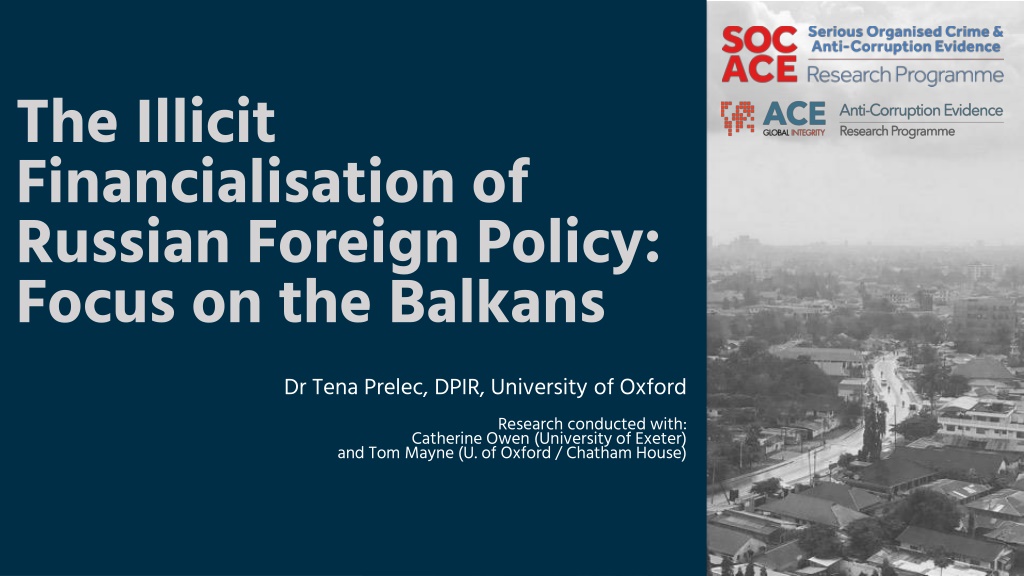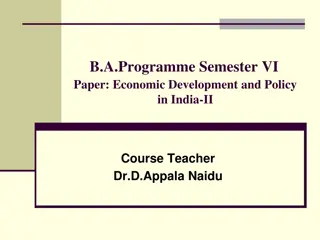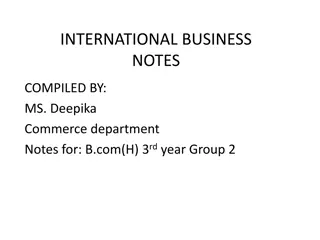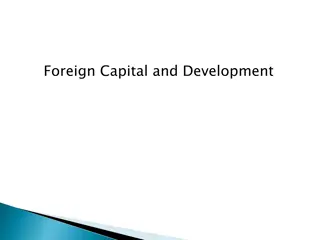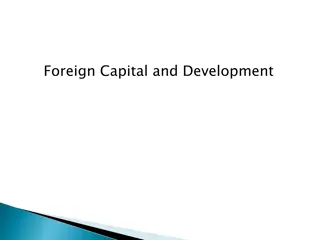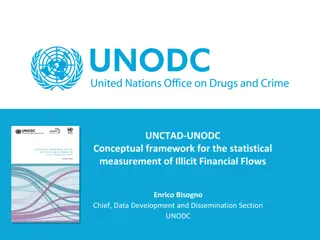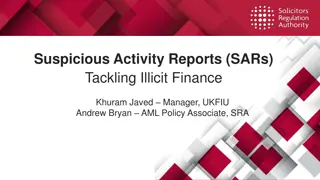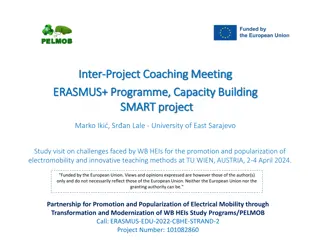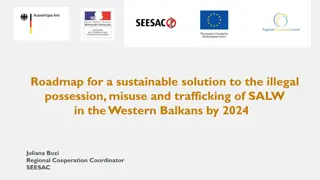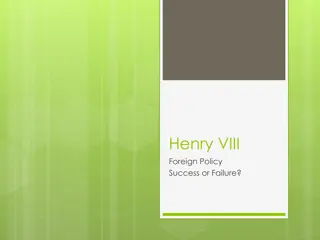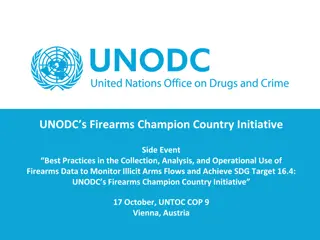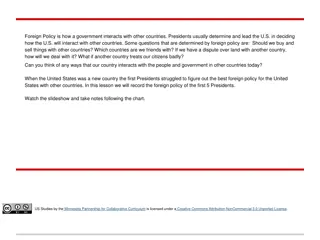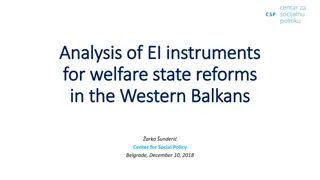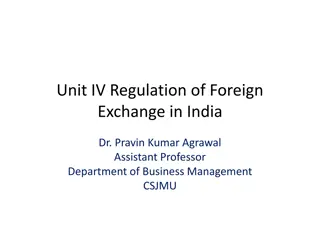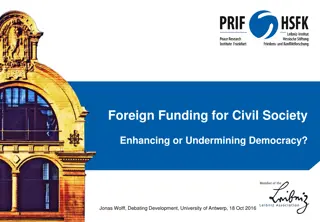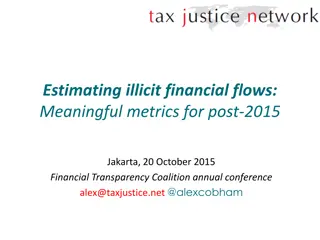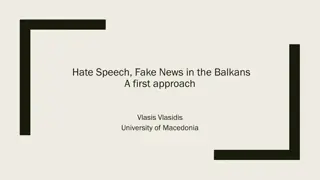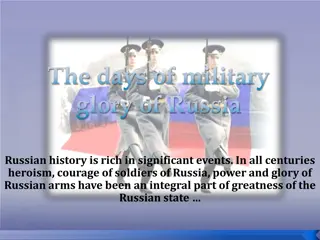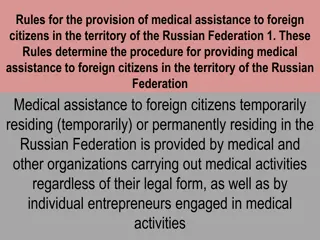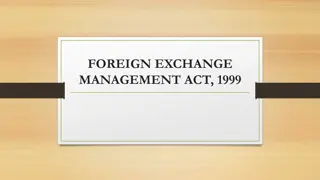Understanding Illicit Financial Activities in Russian Foreign Policy in the Balkans
The research conducted by Dr. Tena Prelec from the University of Oxford, along with other collaborators, delves into the illicit financialization of Russian foreign policy, particularly focusing on the Balkans. The presentation explores the structures, changes post-2022, the West's role in enabling illicit financial flows, and specific cases in Montenegro and Serbia. It highlights the need for a broader approach to understand and combat Russian illicit finance in the region.
Download Presentation

Please find below an Image/Link to download the presentation.
The content on the website is provided AS IS for your information and personal use only. It may not be sold, licensed, or shared on other websites without obtaining consent from the author. Download presentation by click this link. If you encounter any issues during the download, it is possible that the publisher has removed the file from their server.
E N D
Presentation Transcript
The Illicit Financialisation of Russian Foreign Policy: Focus on the Balkans Dr Tena Prelec, DPIR, University of Oxford Research conducted with: Catherine Owen (University of Exeter) and Tom Mayne (U. of Oxford / Chatham House)
Structure of the presentation Introducing our key argument and framework Mapping Russian illicit finance in the Balkans What might have changed after Feb 2022? The West s role in enabling IFF Conclusions and recommendations
Why this framework? Two weaknesses in current understandings of IFF: Our Framework: Mapping the practices that accompany Russian illicit finance 1. By focusing on illegality of money, we miss the fact that much of this money comes from countries where the judiciary may be captured by the executive, allowing illegal to be easily designated as legal 2. It is especially hard to trace IFF if the money cannot be linked to a predicate crime, e.g. in environments with minimal regulatory oversight and the data is not available Therefore, we propose a wider approach that focusses on the malign practices and effects of purported Russian IFF
Securing Russian Illicit Finance in Montenegro Friends with benefits: 2005-2014 Privatisation of KAP through Deripaska Indep referendum campaign (Manafort) Real estate on the coast (Laundromat) Biggest recipient of FDI Lost love?: 2014-2022 Deripaska sues Montenegro Coup / assassination attempt? FDI goes down, but not wholly Going forward: AC & anti-SOC opportunity Russian influence today is often overblown Narrative trap : stabilitocracy Willingness to confront SOC issues, need EU carrot
Securing Russian Illicit Finance in Serbia Gas intermediary schemes & their resilience Set up in the 1990s Attempt to crack down in 2000 Rebound Privatisation Naftna Industrija Srbije (NIS) in 2008 Russia using FP considerations of Serbia to its advantage Obtaining huge concessions Non-privatisation Penetrating the state-owned enterprises through local actors (Socialist Party of Serbia) Local proxies: key.
Takeaways: Balkans (Serbia & Montenegro) FP & IFF are indeed interconnected and part of a wider playbook . Maximise destabilisation gains with little effort and investment However, the two are not always aligned. Sometimes, the nominally most loyal country does not get the better economic reception from the Kremlin. Local proxies are key: what remains a constant is that loyal politicians, businesspeople, and other actors are rewarded with generous spoils. Pragmatism has trumped FP considerations. In the case of the imposition, or lack of imposition, of sanctions in 2014, IFF from Russia will try to reflect that (lack of) shift in the short term. But ultimately, inertia and the loyalty of ad hoc actors have so far been more powerful forces than short-term policy considerations.
What has changed after Feb 2022? AFRICA clearest example: Russia s use of illicit finance has been increasingly widespread across Africa. Informal political and, where necessary, military means are used to secure lucrative natural resource extraction contracts. Some states are not necessarily pro-Russia but certainly anti-Western , which Russian agents can exploit. Depth of anti-Western sentiment on the continent, which Russia is cleverly manipulating in order to advance illicit financial flows. 1) Recipients of IFF Western sanctions may lead to more illicit financial flows between Russia and Africa, not less. Ties with mineral-rich African states such as Sudan, but also the Central African Republic, Burkina Faso, Mali and others, may enable Moscow to minimize the impact of Western sanctions.
What has changed after Feb 2022? Pre-Feb 2022: Putin as the final arbiter . Balancing several interest groups: - Dollar capital (incl. oligarchs) - Energy complex - Ruble capital - Military - Siloviki - Church Post-Feb 2022: The influence of some of some of them was thrown out of the window (also literally). 1) Decision- makers in Russian FP What is left? Ideologically-minded actors Authoritarianism turning into totalitarianism Whimsical decisions front and centre.
The UKs Kleptocracy Problem The intertwining of financial globalization with the post- Soviet transition The UK s risk-based system is effectively risk-insensitive all process, no outcome Failures of enforcement have led to flawed judgments by UK courts The provision of aggressive reputation management services in the UK means we know less than we should The integrity of important domestic institutions including parliament and the parties is undermined In sum, the UK has effectively serviced the system in Russia and not only!
Conclusions Russian foreign policy initiatives rely on informal and patronal relationships with domestic elites. They can therefore provide legitimation, or cover , for IFF or viceversa. We have grouped these relationships into three conceptual spheres, political , media and violence : they are used alongside one another and mutually reinforce one another, with an escalatory tendency if things do not work out for Russia (from the projection of soft power violence) Anti-corruption response: less ad-hoc and reactive, but recognize it as a systemic issue: Given the long-term character these processes take, it is important to take a long-term view on the solutions: there is no short-cut to deep-seated democratization (stabilitocrats can be allies only in the short run and still get us nowhere).
Contact Us @tenaprelec @TomMayne11 @CatOwenExeter https://www.birmingham.ac.uk/schools/government/departments/international-development/research/soc-ace/index.aspx
